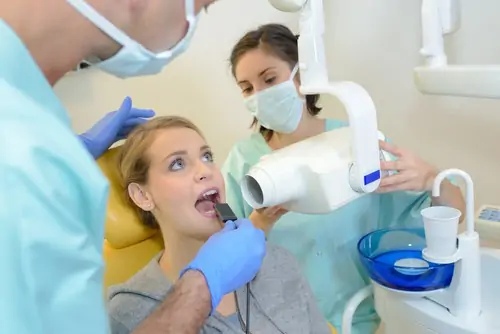
X-Rays are detailed photographs that give an interesting look at our bones and help doctors find breaks. But did you know that x-rays are used for much more than identifying broken bones? In fact, your dentist in McMinnville uses x-rays to see parts of your mouth and teeth that can’t be seen with the naked eye and are an important part of dentistry.
What’s Your Dentist Looking For?
At your dental appointments, your dentist may take some x-rays of your teeth and jawbones. These x-rays can help your dentist keep a close eye on how the health of your teeth changes over time, and provide valuable insight into potential problems when they can still be treated easily.
Younger patients benefit from dental x-rays because these images show both the baby teeth and the permanent teeth that are waiting to erupt. The specialized view of x-rays shows changes in the mouth as kids grow and can show early signs of potential problems so you can take a preventive approach.
The easiest way to treat dental decay and cavities are when they’re in the earliest stages and before you may even notice any problem. Your dentist in McMinnville is trained to examine x-rays of your teeth to find hidden cavities or early signs of decay that can’t be seen with a regular visual exam.
As we age, it’s common for our bones to weaken. This can also happen to the jawbones and cause the face to appear saggy, cause discomfort when chewing, or headaches and jaw pain. Bone loss can be caused by any number of things but is most commonly a result of tooth loss, gum disease, or osteoporosis.
Dental x-rays also allow your dentist to see any areas of infection in or around the tips of tooth roots. If this is the case, you will usually have signs of toothache. Infections inside the teeth are often treated with a root canal, perhaps a dental crown, and in severe cases may require a tooth extraction.
Are Dental X-Rays Safe?
Advancements in dental technology, including x-ray technology, make dental x-rays incredibly safe for all patients, including children. In fact, digital dental x-rays emit one of the lowest forms of radiation. According to the Kois Center for Dental Education, four bitewing x-rays emit only 0.005 mSv (millisieverts), which is less than what we’re exposed to every day naturally. Additionally, since dental x-rays are usually only done once a year, although sometimes more, they’re nothing to worry about.
If your dentist in McMinnville recommends dental x-rays, know that it’s to help keep your mouth and teeth healthy. X-rays can prevent problems from growing into bigger, more costly concerns down the road and can help protect your smile for life.